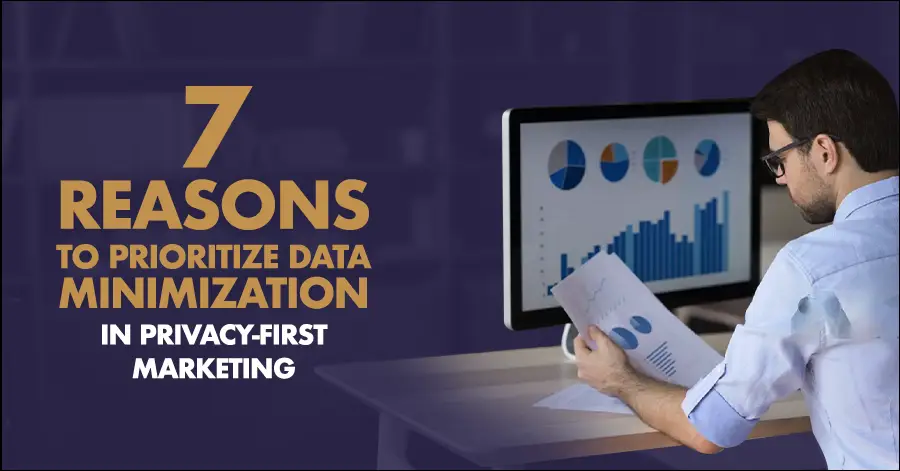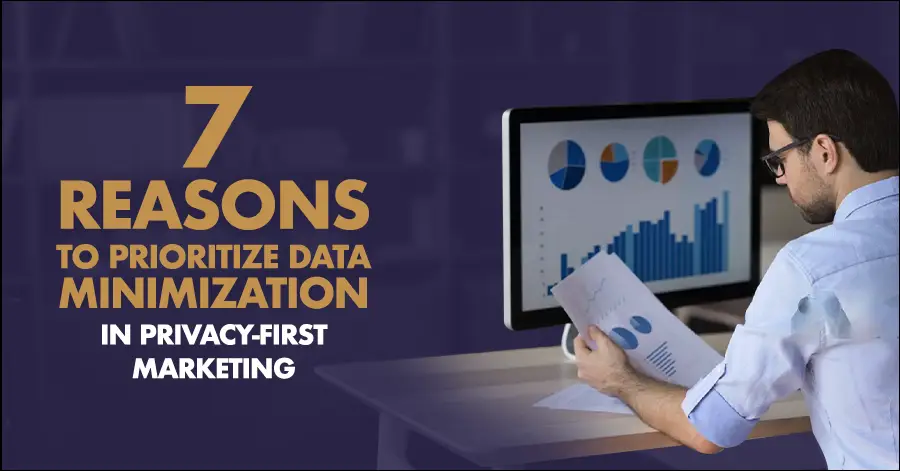7 Reasons to Prioritize Data Minimization in Privacy-First Marketing


Privacy has completely changed the landscape of online marketing. While many companies have had to adjust their practices, one particularly significant change stands out: data minimization, the practice of collecting only the data needed for a particular purpose.
Data minimization helps with more than basic legal compliance. It is a critical step whether your company wants to lessen the impact of a potential data breach, prioritize customer trust, or follow privacy laws as strictly as possible. Today, we’re looking at what seven industry experts have to say on the role of data minimization.
Lower Data Breach Impact

Khurram Mir, Founder and Chief Marketing Officer, Kualitee
One explanation for why minimization of data is vital in privacy-first marketing is that it considerably lowers the impact of data breaches and unauthorized access.
Organizations can limit the exposure of sensitive information during a cyber-attack by only gathering and keeping the necessary data for particular marketing uses.
This doesn’t just protect consumer privacy, but it also fosters trust and establishes a good name for the company in terms of data security and ethical use of information.
Avoid Cyberattacks, Limit Unnecessary Data

Elmo Taddeo, CEO, Parachute
At Parachute, we’ve seen how storing unnecessary data can make a company a bigger target for cyberattacks. Less data means less exposure. During a security audit for a client, we found they were storing outdated customer information, which was eventually accessed in a breach. Minimizing the data they kept could have prevented potentially sensitive information from being exposed.
Keeping only essential data simplifies compliance with privacy regulations. As CEO of Parachute, I’ve worked with numerous clients who struggle with meeting GDPR and CCPA requirements. One client, a small business, faced hefty fines due to non-compliance. By adopting data minimization practices, they became compliant and found it easier to manage their data overall.
Customers are more likely to share their information when they know it’s being handled responsibly. At Parachute, we prioritize educating our clients about the importance of data minimization. One of our clients, a legal firm, saw an increase in client confidence and business after implementing these practices. Trust is built through transparency and responsibility in data handling.
Navigate Regulatory Changes Effectively

Saurabh Kumar, Senior Manager and Data Science, Kraft Heinz Foods Company
As a data privacy expert with experience in data science, machine learning, and AI, I’ve seen the impact of regulatory changes and technological advancements on marketing. My tenure at Facebook and Uber has given me insights into strategies developed to navigate the evolving privacy landscape.
Apple’s App Tracking Transparency (ATT) framework in iOS 14.5, which allows users to opt out of cross-app tracking, has disrupted conventional targeted advertising. The European Union’s GDPR and browsers like Safari and Chrome’s deprecation of third-party cookies further emphasize the need for a privacy-first marketing approach. In this changing environment, data minimization is essential for compliance, trust, and effective marketing. By collecting only necessary data, organizations can reduce the risk of data breaches, enhance transparency, and build ethical customer relationships.
Industry leaders like Facebook, Google, and Uber are developing solutions that prioritize data minimization and user privacy. Facebook’s Conversions API (CAPI) and Google’s Privacy Sandbox exemplify these efforts, offering alternatives to traditional tracking while minimizing sensitive data collection. CAPI allows businesses to securely share web event data with Facebook, eliminating the need for browser-based tracking and ensuring accurate campaign measurement. Meanwhile, Google’s Privacy Sandbox introduces technologies to replace third-party cookies.
In conclusion, data minimization is crucial for privacy-first marketing. As regulations and consumer expectations evolve, organizations must prioritize data minimization to maintain compliance, build trust, and deliver effective campaigns. The innovative solutions from industry leaders and the exploration of differential privacy represent progress towards a future where data privacy and effective marketing coexist harmoniously.
Focus on Liability Reduction

Ricci Masero, EdTech Evangelist and Marketing Manager, Intellek
Let’s be real—companies these days are collecting a ton of our personal information. While some of it’s necessary to personalize ads and experiences, a lot of it feels like overkill. The more data they hoard, the bigger the risk of it getting hacked or misused in some way that affects our privacy. That’s why the idea of “data minimization” is a big deal for companies doing privacy-first marketing.
The bottom line is that the less of our personal stuff companies are holding onto, the less exposure there is if they have a data breach. By only collecting the information they actually need, they’re cutting down on liability and showing customers they respect our privacy. It’s a matter of keeping it lean – gather only what’s essential to customize the marketing experience, and ditch the rest. That builds way more trust with people than hoarding our data for no good reason.
Maximize Security, Build Trust

Craig Bird, Managing Director, CloudTech24
One of the primary reasons why data minimization is essential in privacy-first marketing is to reduce the chances of data breaches and unauthorized access. When collecting only the data absolutely necessary for marketing purposes, organizations can significantly reduce the volume of sensitive information that may potentially be exposed during a breach.
As a result, the security of customer data is maximized while building customer trust, especially among those who have greater concerns about protecting their personal information. In addition, adherence to data minimization ensures compliance with privacy regulations such as GDPR, which only permits the collection of minimal data for specific purposes.
Protect Customer Privacy Proactively

Alex Stasiak, CEO and Founder, Startup House
As the CEO of Startup House, I believe that data minimization is crucial in privacy-first marketing because it reduces the impact of data breaches and protects customer trust.
By only collecting and storing the necessary data, we can limit the potential exposure of sensitive information and ensure that our customers feel secure in sharing their data with us. Remember, “less is more” when it comes to data collection—prioritize privacy to build long-lasting relationships with your customers.
Minimize at Multiple Points in the Process

James Wilson, Personal Cybersecurity Expert, My Data Removal
The more personal data you have, the more at-risk the targets of that data are in a data breach. If you only have names, that’s not too bad, but if you have lots of demographic information, preferences, web history, and other things, your targets will be much more exposed in the case of a breach. If privacy is a priority, you are trying to minimize the data as much as possible at multiple points in the process.
If you aren’t already prioritizing data minimization and privacy-first marketing, it’s long past time to start. Contact our team of privacy experts today to get on track.





